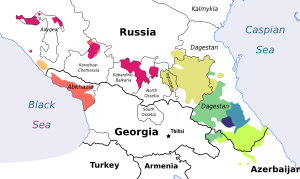Caucasic languages
| North Caucasian | |||
|---|---|---|---|
| Caucasic | |||
| (controversial) | |||
| Geographic distribution |
Caucasus | ||
| Linguistic classification | Proposed language family | ||
| Subdivisions | |||
| ISO 639-5 | |||
| Glottolog | None | ||

North Caucasian languages
|
|||
West Caucasian
East Caucasian
The North Caucasian languages, sometimes called simply Caucasic, are a pair of well established language families spoken in the Caucasus, chiefly in the north: the Northwest Caucasian family, also called Pontic, Abkhaz–Adyghe, Circassian, or West Caucasian; and the Northeast Caucasian family, also called Nakh–Dagestanian or East Caucasian.
The Kartvelian languages including Georgian and Laz, once known as South Caucasian, are no longer considered genetically related to the North Caucasian languages and are classed as an independent language family.
Some linguists, notably Sergei Starostin and Sergei Nikolayev, believe that the two groups sprang from a common ancestor about five thousand years ago. However, this proposal is difficult to evaluate, and remains controversial.
There are some 34 to 38 distinct North Caucasian languages.
Among the linguists who support the North Caucasian hypothesis, the main split between Northeast Caucasian and Northwest Caucasian is considered uncontroversial. Problems arise when it gets to the internal structure of Northeast Caucasian itself. So far no general agreement has been reached in this respect. The following classification is based on Nikolayev & Starostin (1994):
The main perceived similarities between the two phyla lie in their phonological systems. However, their grammars are quite different.
Both phyla are characterised by high levels of phonetic complexity, including the widespread usage of secondary articulation. Ubykh (Northwest) has 84 consonants, and Archi (Northeast) is thought to have 76.
A list of possible cognates has been proposed. However, most of them may be loanwords or simply coincidences, since most of the morphemes in both phyla are quite short (often just a single consonant).
...
Wikipedia
